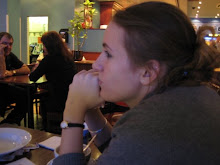"He knew that the child was his warrant. He said: If he is not the word of God God never spoke."
My brother described Cormac McCarthy's The Road as being the most brutally hopeful book he'd ever read. I'm not sure I understood what he meant. I assumed, I suppose, that the book would be both brutal and hopeful. And it is. But it is also more than that. It is a book that is brutal in its hope.
On the surface, it seems to be a story about goodness -- human goodness -- in the face of darkness and death. A world gone mad with fear and brutality. A story about a boy and his father, "carrying the fire." As such, the book is powerful, the book is hopeful, and the book resonates, deeply. For who of us does not long to believe that the human capacity for good -- the breath of God inside us -- is capable of overcoming the dark? Of weathering the end of all things? Such truth would be grace enough, it seems. Proof of a loving God.
But McCarthy refuses to end there. He must go further. Must push the boundaries of what we can accept. What we can believe. Must shower his characters with a different type of goodness. So that, despite a world grown old without food, in which humans themselves are the final source of sustenance, his characters do not starve. Their constant luck, in a world long since picked clean, is so beyond the acceptance of realism, that the only answer seems to be in the miraculous. They are being provided for. Ever trudging forward, without reason to expect that anything should be different where they are going than where they have been, they are yet rewarded, like Abraham, for their faith.
And so the foundations of a powerful story are shaken. McCarthy forces his readers to make a conscious choice. Accept his vision, or reject it. There is no middle ground. This is either a fanciful daydream, without relevance in our world of brutal reality, or it is a story -- as unsettling as Old Testament prophecy -- of the active presence of God in our world.
Unsettling, because the question it does not answer is: why him? Why should one child be spared among millions? Why, while one child is baked over the coals, does another love and eat and survive?
The age old question of evil, which has stumped so many philosophers, and agonized the humanitarian minded, is not, I think, primarily a question of existence. It is not the evil itself that bothers us, so much as the unfairness of it all. We don't wonder why there is suffering so much as we wonder why some seem to suffer so much more than others. It is the arbitrariness that goads us, and makes God seem as heartless as the Greek divinities of old.
Yet still McCarthy asks, do we believe the promises? Goodness and mercy that follow us. A future and hope that prosper us.
What, when all is said and done, do we believe about God?
And it is here that my brother came to the rescue. Reminding me, in the words of Aslan, that we are never told any story but our own. This is not the story of the child roasted in the fire, or even the story of those who ate him. It is the story of a small boy, and the father who loved him. If my God is able (and willing) to provide everything I need for life and godliness, surely God is able to do the same for my neighbor, and the stranger I read about in the newspaper, and every other story that God, not I, knows.
It feels safe and reasonable to believe in the goodness of God in the abstract. But it is truth to believe it in the concrete.
On a stylistic note, The Road is written in prose poetry. Beautiful, compelling, and utterly unique.
Practices for Disturbing Times
5 years ago


No comments:
Post a Comment